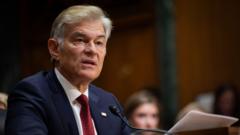The U.S. Senate has officially confirmed Dr. Mehmet Oz to oversee the Centers for Medicare and Medicaid Services (CMS). Despite his celebrity status and medical background, Oz's appointment raises concerns due to his history of promoting questionable health advice.
Dr. Oz Takes Charge: Controversial Celebrity Doctor Confirmed to Lead Medicare and Medicaid

Dr. Oz Takes Charge: Controversial Celebrity Doctor Confirmed to Lead Medicare and Medicaid
Dr. Mehmet Oz's confirmation as head of CMS marks a pivotal moment in U.S. healthcare policy under the Trump administration.
In a party-line vote of 53-45, the Republican-controlled Senate confirmed Dr. Oz, selected by former President Donald Trump, to lead the agency that manages healthcare for millions of Americans. A trained surgeon, Oz gained fame through his appearances on The Oprah Winfrey Show and later hosted The Dr. Oz Show until 2022. However, his promotion of alternative treatments and pandemic responses has faced significant backlash from health experts.
Critics have raised alarm over his previous endorsements of "miracle cures" and misleading health information, with some highlighting instances during the COVID-19 pandemic where he suggested malaria medications could combat the virus. These controversies have followed him into his new role, where he is expected to oversee critical healthcare policies affecting nearly half of the U.S. population.
The CMS is responsible for managing Medicare and Medicaid, with combined expenditures exceeding $1.4 trillion in 2023. Despite scrutiny regarding his financial records and suggestions he may not have paid Medicare taxes on millions of dollars in earnings, a spokesperson for Oz maintains that he complied with all regulations, as verified by the Office of Government Ethics.
As Dr. Oz prepares to take the helm, his collaboration with U.S. Health Secretary Robert F. Kennedy Jr. is eagerly anticipated, although concerns about his past practices linger among the healthcare community and constituents awaiting clear and effective public health policies in the years to come.






















